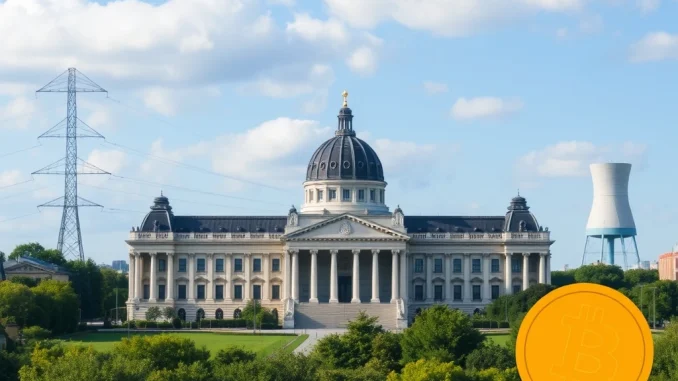
A significant decision from the French National Assembly has caught the attention of the crypto world. French Lawmakers have opted against exploring a potential avenue for the country’s Excess Energy: using it for Bitcoin Mining. This move, reported by Bitcoin.com News, signals a reluctance within the French government to seriously consider cryptocurrency-related activities as part of their national infrastructure planning, particularly concerning energy management.
What Did French Lawmakers Decide Regarding Bitcoin Mining?
The core of the matter was a proposed amendment. This amendment wasn’t a direct call to immediately start using energy for mining. Instead, it was a much more modest proposal: to simply initiate a study into the feasibility and potential benefits of utilizing France’s surplus energy for Bitcoin Mining operations. However, French Lawmakers decided against even this preliminary step. The amendment was dismissed on procedural grounds, effectively preventing any detailed debate or investigation into the concept’s merits or drawbacks.
This procedural dismissal means the topic wasn’t given a chance for in-depth discussion, halting any potential progress before it could even begin. It highlights a cautious, perhaps even dismissive, stance towards integrating crypto-related industrial activities into traditional energy infrastructure planning in France.
Understanding France Energy and Potential Excess
France Energy landscape is unique in Europe, largely dominated by nuclear power. This provides a significant baseline of energy production, which at times can lead to periods of surplus, especially during off-peak hours or seasons with lower demand. Managing this Excess Energy is a challenge. Traditional methods include selling it to neighboring countries (often at reduced prices), storing it (which is costly and complex), or curtailing production (which is inefficient).
Globally, there’s a growing discussion about how Bitcoin Mining could potentially offer a solution for this exact problem. Miners seek the cheapest energy available, and Excess Energy often fits this criterion. By setting up mining operations near the source of surplus power, energy that might otherwise be wasted or sold cheaply could be monetized, providing a revenue stream and stabilizing the grid by creating a consistent demand for otherwise intermittent or surplus supply.
Why is Utilizing Excess Energy for Bitcoin Mining Being Considered Elsewhere?
The idea isn’t unique to the dismissed French amendment. Several regions worldwide are exploring or already implementing this strategy. Here’s why:
- Monetization: Turns otherwise low-value or wasted energy into revenue.
- Grid Stability: Provides a flexible load that can consume surplus energy, helping balance the grid.
- Utilization of Renewables: Can be paired with intermittent renewable sources (like solar or wind) to use power generated when demand is low.
- Economic Development: Creates jobs and investment opportunities in energy-producing regions.
Examples include projects in the United States, Canada, and other countries where miners are co-locating with energy producers, particularly those dealing with flared natural gas or remote renewable sites.
What Does This Mean for Bitcoin France?
The decision by French Lawmakers is a setback for proponents of integrating Bitcoin Mining into the national France Energy strategy. While it doesn’t ban mining outright, it signals a lack of governmental interest in exploring its potential benefits for energy management. This could influence future regulatory discussions and potentially deter large-scale mining investments that aim to leverage France’s specific energy profile.
For the Bitcoin France community, this means the path towards gaining governmental recognition or support for energy-intensive crypto activities remains challenging. It underscores the need for continued education and advocacy to highlight the potential economic and grid-stabilization benefits that Bitcoin Mining, when properly implemented, could offer, especially in utilizing Excess Energy.
Conclusion: A Missed Opportunity for France Energy?
The dismissal of the amendment by French Lawmakers represents a missed opportunity, at least for now, to formally study a potentially innovative solution for managing France Energy surplus. While concerns about Bitcoin Mining‘s energy consumption are valid, exploring how it could specifically utilize otherwise wasted or surplus power is a distinct conversation. By shutting down the possibility of a study on procedural grounds, France has chosen not to engage with a concept that other nations are actively investigating for its potential benefits in energy economics and grid resilience. The future of Bitcoin France‘s role in the national energy picture remains uncertain following this decision.



